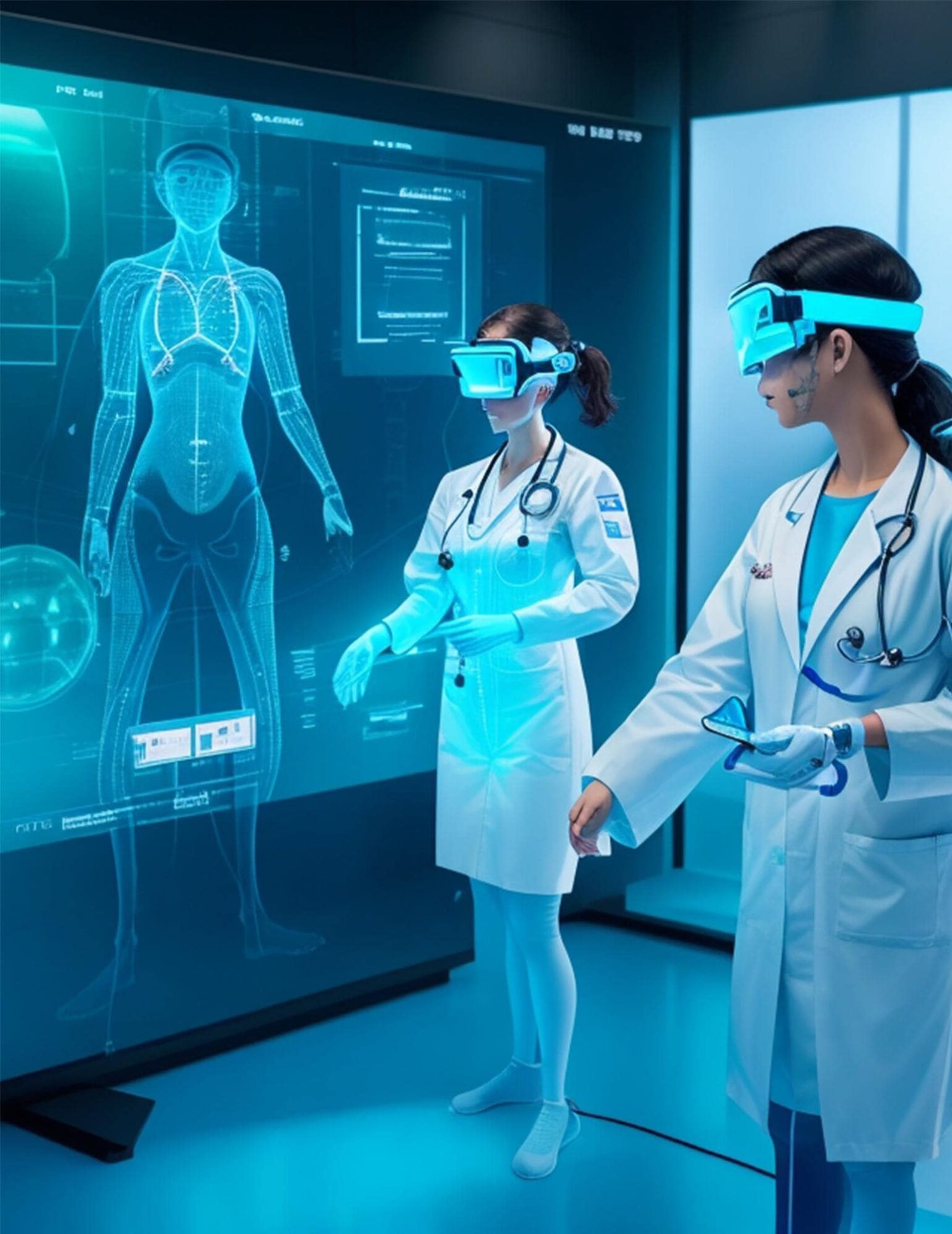The AI-Powered Healthcare Renaissance represents a transformative era in healthcare, marked by the convergence of artificial intelligence (AI) technologies, advanced data analytics, and digital health solutions. This renaissance is reshaping diagnosis, treatment, and patient care in profound ways, driving innovation, improving outcomes, and enhancing the efficiency of healthcare delivery. Here’s an exploration of the latest trends and innovations shaping this healthcare revolution:
Diagnosis and Medical Imaging:
- AI-Assisted Diagnosis: AI algorithms are augmenting medical professionals’ diagnostic capabilities by analyzing medical images, such as X-rays, MRIs, and CT scans, to detect abnormalities, identify patterns, and assist in diagnosis, leading to earlier detection of diseases and more accurate treatment planning.
- Radiomics and Imaging Biomarkers: Radiomics leverages AI to extract quantitative data from medical images, enabling the identification of imaging biomarkers and predictive models for disease diagnosis, prognosis, and treatment response assessment, facilitating personalized medicine and precision oncology.
Treatment Planning and Precision Medicine:
- Personalized Treatment Plans: AI-driven algorithms analyze patient data, including genomic, proteomic, and clinical information, to generate personalized treatment plans tailored to individual patient characteristics, genetic profiles, and disease pathways, optimizing treatment efficacy and minimizing adverse effects.
- Drug Discovery and Development: AI accelerates drug discovery and development processes by analyzing vast datasets, predicting drug-target interactions, simulating molecular structures, and identifying novel drug candidates, leading to faster, more cost-effective drug development and precision therapeutics.
Remote Monitoring and Telemedicine:
- Remote Patient Monitoring: AI-enabled wearable devices, sensors, and remote monitoring platforms collect real-time health data, such as vital signs, activity levels, and biometric measurements, enabling continuous monitoring, early detection of health issues, and proactive interventions to improve patient outcomes.
- Telemedicine and Virtual Care: AI-powered telemedicine platforms leverage chatbots, virtual assistants, and teleconsultation tools to enable remote consultations, diagnosis, and treatment delivery, enhancing access to healthcare services, reducing healthcare disparities, and improving patient satisfaction and convenience.
Clinical Decision Support Systems (CDSS):
- AI-Powered CDSS: Clinical decision support systems integrate AI algorithms, medical knowledge databases, and patient data to provide evidence-based recommendations, diagnostic assistance, treatment guidelines, and decision support tools to healthcare providers, enhancing diagnostic accuracy, treatment efficacy, and patient safety.
- Real-Time Insights: AI-driven CDSS analyze patient data in real-time, identify clinical patterns, predict adverse events, and alert healthcare providers to potential risks, enabling proactive interventions, timely decision-making, and improved patient outcomes across various clinical settings.
Ethical and Regulatory Considerations:
- Data Privacy and Security: Addressing ethical concerns, data privacy regulations, and security challenges is paramount in AI-powered healthcare, ensuring patient confidentiality, data protection, and compliance with regulatory requirements, such as HIPAA, GDPR, and ethical guidelines for AI adoption in healthcare.
- Algorithm Transparency and Bias Mitigation: Transparent AI algorithms, explainable AI models, and bias mitigation techniques are essential to ensure the reliability, accountability, and fairness of AI-driven healthcare systems, fostering trust among patients, healthcare providers, and regulatory authorities.
Collaboration and Interdisciplinary Research:
- Cross-Sector Collaboration: Collaboration between healthcare institutions, technology companies, academic researchers, and regulatory bodies fosters interdisciplinary research, knowledge exchange, and innovation diffusion, accelerating the adoption of AI-powered healthcare solutions and driving continuous improvement in patient care.
- Evidence-Based Medicine: Rigorous evaluation, clinical validation, and evidence-based research are essential to assess the clinical efficacy, safety, and cost-effectiveness of AI-powered healthcare technologies, translating scientific discoveries into clinical practice and guiding informed decision-making in patient care.
Conclusion:
The AI-Powered Healthcare Renaissance represents a paradigm shift in healthcare delivery, driven by AI-driven technologies, digital innovations, and data-driven approaches. By leveraging AI for diagnosis, treatment, remote monitoring, and clinical decision support, healthcare systems can enhance patient outcomes, optimize resource utilization, and advance the practice of precision medicine and personalized healthcare delivery. However, addressing ethical, regulatory, and implementation challenges is crucial to realizing the full potential of AI in healthcare and ensuring equitable access to AI-powered innovations for all patients, providers, and stakeholders in the evolving healthcare landscape.



